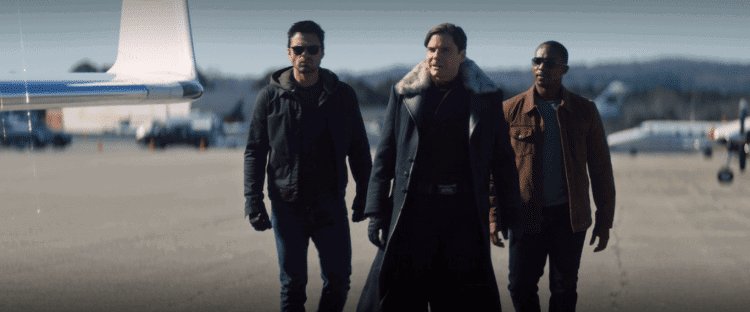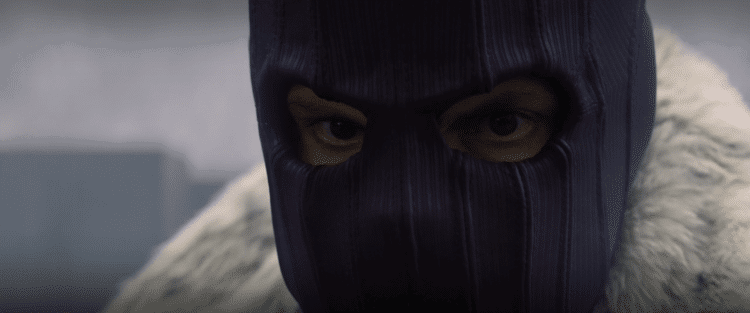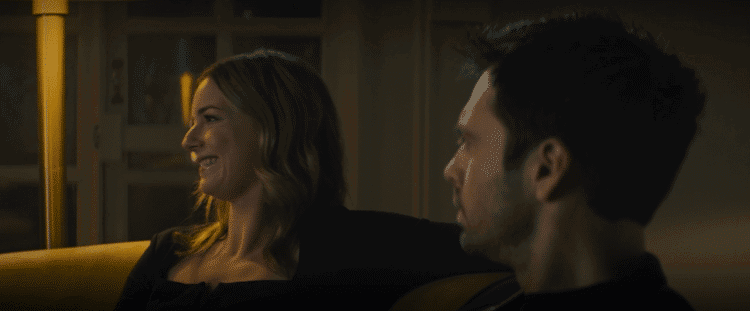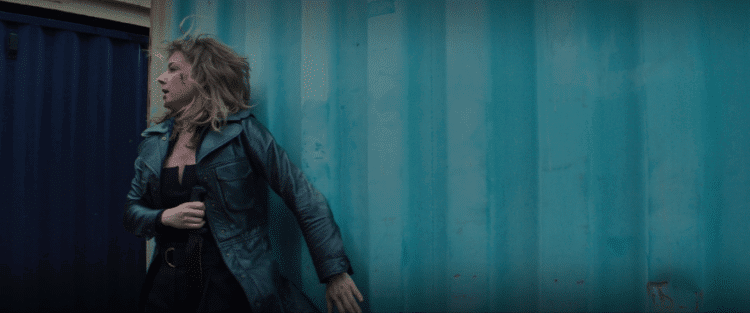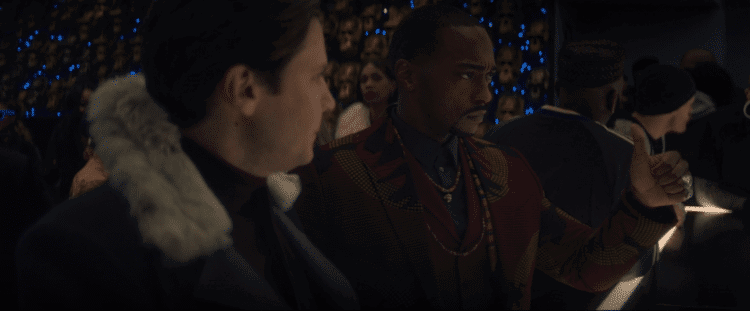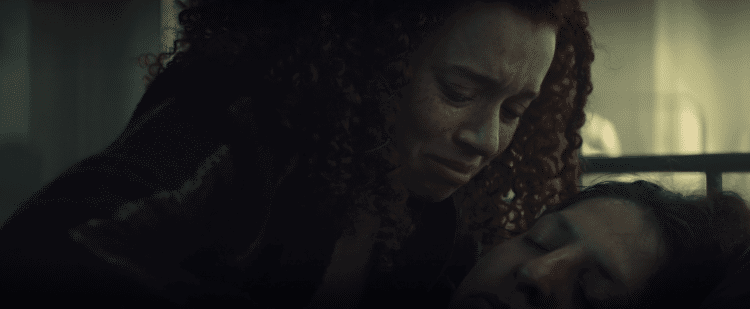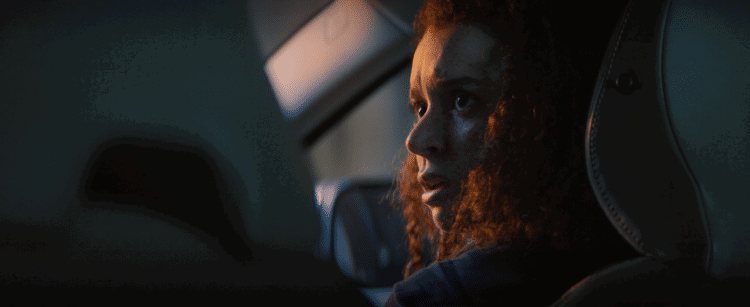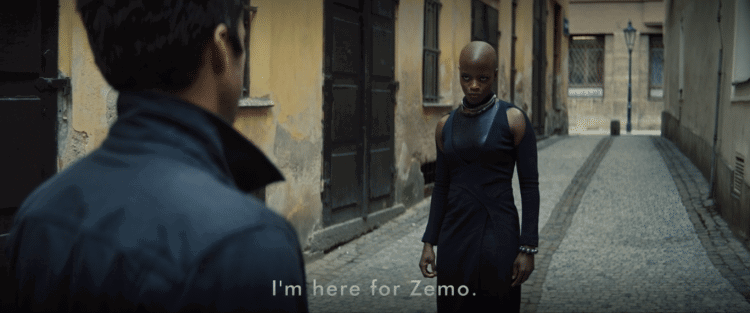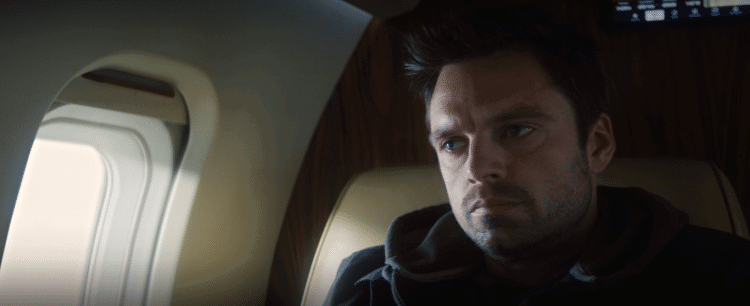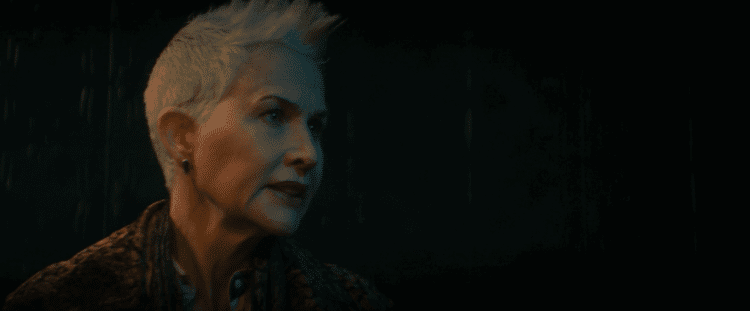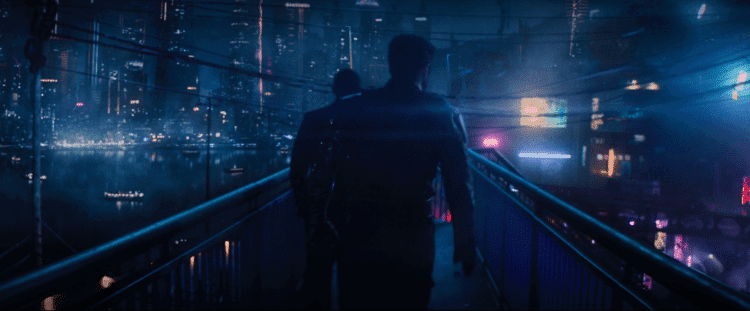Showrunner Malcolm Spellman and writer Derek Kolstad took a big risk in “Power Broker,” the third installment of the tremendous Falcon and the Winter Soldier series. While rooted in Captain America lore, the show’s opening episodes told a story that casual MCU fans could follow without a deep understanding of Cap’s Phase 2 films. “Power Broker” abandons that philosophy, placing two long forgotten characters centerstage in Baron Zemo (Daniel Bruhl) and Sharon Carter (Emily VanCamp). While less passionate fans may find themselves lost amidst talk of Zemo’s destruction of the Winter Soldier program and Sharon’s time working for #TeamCap, the result is yet another success. “Power Broker” is more subtle in its character work than the previous episodes, but top-notch action sequences, fantastic performances from Bruhl and Sebastian Stan, and an emphasis on consequences keep Falcon and the Winter Soldier’s winning streak alive.
Bucky Barnes’ decision to break Helmut Zemo out of prison will have negative consequences down the road, but the decision paid off in a big way this week – both in terms of Zemo’s usefulness to the team and the advantages he provides to the story. Like many of the most compelling villains across fiction, Zemo doesn’t have superpowers. He fights with his mind, and his psychological edge makes every one of his scenes tense. You never know when the double-cross is coming – only that it is – and that knowledge makes it impossible to turn away when he’s on screen.
Kolstad and Director Kari Skogland take full advantage of that tension during a shockingly gruesome gunfight at the Madripoor Cargo Station. After suddenly offing the scientist responsible for creating the new super soldier serum, Zemo disappears behind a wall of smoke, seemingly abandoning Sam and Bucky in the chaos. He blows unsuspecting bounty hunters to bits with one well-placed bullet to a flammable pipe, donning his signature purple mask before the action swings back to our heroes’ perspective. Just when you think he’s vanished, Zemo pulls up in what I assume is a 1980s Pontiac to drive them off to safety. The scene captures the traits that make Zemo so dangerous: intelligence, strategy, and unpredictability.
Daniel Bruhl elevates the fantastic material he’s given, and his performance is so compelling that it’s hard not to wish for a Civil War cut that puts him front and center more often. In 43 minutes, Bruhl successfully imitates Hannibal Lecter, espouses the brilliance of Marvin Gaye’s “Troubleman,” dances awkwardly at a house party, and delivers key exposition about the dangers of putting symbols like Steve Rogers on a pedestal. Bruhl’s Zemo is constantly charismatic, and he can be as funny as he is unpredictable. His performance is every bit as good as Wyatt Russell’s tremendous turn as John Walker last week.
While the bill for freeing Zemo has yet to come due, consequences for supporting Steve and Sam against the United Nations have transformed Emily VanCamp’s Sharon Carter into a more interesting character than the one we left in Civil War. Carter has traded her strong moral compass for a life of luxury in Madripoor’s wealthy district, selling stolen artwork to sustain her new lifestyle. While she spends her handful of scenes ostensibly helping Sam and Bucky track the mysterious Power Broker, she ruthlessly mows down dozens of bounty hunters in a way that would make her Great-Aunt Peggy uncomfortable. Sharon has become an anti-hero, and that’s a big upgrade over being Steve’s love interest and a plot device.
VanCamp’s performance in the new role is a little uneven. She clearly feels more comfortable being an action star than discussing the merits of heroism. She tries to sell Sharon’s jadedness a little too hard, and it makes a scene where she harbors Sam, Bucky and Zemo in her apartment feel unnatural. Her most important lines are meant to further damage the idea of heroes, but VanCamp’s delivery and a shaky script point out how absurd her view that heroes are “bullshit” is. Sure, the Avengers created some issues in Sokovia and Lagos, but they also saved half the population from fading from existence forever. It’s hard to question the concept of heroes in a world where that happened.
That being said, VanCamp is tremendous when she’s out in the field. Sharon is the star of the scene at the cargo bay, throwing knives into people’s arms and wiping out dudes twice her size two at a time. Her final moments hint at a double-cross, and if that comes to fruition, there will be more time for VanCamp to shine.
While Zemo and Carter scheme, Sam and Bucky squabble, and at this point it’s hard to blame Bucky for being sick of his partner. This is a rough episode for Sam Wilson. First, he has to take a shot filled with snake guts. Then, he blows an undercover operation by forgetting to turn his cell phone to silent – unforgivable given the stakes. Worst of all, as more characters get introduced, he has become more of a secondary character rather than the show’s namesake.
Bucky, Zemo, and John are in control of their journeys, but Sam is just along for the ride. His primary goal is to stop the Flag Smashers, but not since early in episode 2 has his story focused intently on that. Instead, Sam is being used to examine America’s racial divide. Instead of seeking to uncover sins of the government’s past, however, his knowledge grows purely through being there when something happens. Bucky introduces him to Isaiah Bradley, and Sam stands in the background while they talk. Sharon tells him the hero stuff is bullshit, and he nods. Sam hasn’t been the driving force behind his change in perspective, and that pushes him further away from the more interesting action.
It also makes his speech in the episode’s climax feel out of character and sudden. Wilson tells Bucky he made a mistake by turning in Cap’s shield; he thinks he should have destroyed it instead. The view stems from the revelation that the government abused Isaiah Bradley and destroyed Sharon’s life. Those misdeeds are horrific, but ultimately the vibranium shield should symbolize more to Wilson than just the U.S. Government. Wilson’s relationship to it was grounded in his bond with Steve, and his decision to destroy it feels like an unintended shot at Rogers. Spellman wants viewers to separate Steve Rogers from the vibranium shield, but that’s impossible to do – especially in three episodes of television. Sam’s relationship to the shield will continue to grow in the episodes to come, but this heel-turn could have been executed better.
Sam’s declaration did provide Sebastian Stan’s Bucky Barnes to deliver a tremendous speech defending the shield – just one of many high points for Bucky. Bucky may be an emotional mess, but he’s no dummy. His certainty that John Walker won’t last as Captain America shows he’s still capable of seeing the board clearly, adding a little intellectual savvy to a character who’s best known for punching things, and his determination to take the shield for himself makes him easy to root for.
Sebastian Stan’s line readings are tremendous throughout. Early in the episode, Bucky preps Sam for the news that he broke Zemo out of prison. Sam is furious, and Bucky tries to win him over by somewhat angrily pleading “Can I give you a hypothetical?” It’s a laugh out loud moment, and Stan’s ability to draw comedy from this gravely serious character can’t be praised enough.
Stan can also switch gears between tender, quiet moments and all-out ass-kicking better than anyone. A scene on Zemo’s plane reveals Bucky’s amends notebook is actually the same one Steve used to jot down important things he missed while frozen in the ice. Their bond lives on even though Steve disappeared, and there’s an understated sweetness to the scene. A few minutes later, Bucky demolishes goons in a bar, impales a lady just above the heart, and gets swept up in his old Winter Soldier routine. The savagery contrasts effectively against the sweet and makes Bucky a character you can’t help but worry for.
Rarely does a show get everything right, however, and Falcon and the Winter Soldier’s Achilles’ heel continues to be Karli Morgenthau and the Flag Smashers. Karli (Erin Kellyman) does have the potential to be a sympathetic villain, due largely to Kellyman’s calm performance, but it’s squandered by poor writing. Morgenthau’s failure as a character is encapsulated by an early scene where someone named Mama Donya (Veronica Falcon) dies from tuberculosis. Until her death, Mama Donya played no role in the story, so it’s hard to empathize with Karli crying over her as she sleeps.
She also falls into the same trap that stopped Erik Killmonger from becoming a truly great villain. Killmonger had far better character development – the opening scene at the museum is a masterful one – but he never felt justified in his actions because he was too evil. Just in case audiences found themselves on his side, he shot and killed his girlfriend to force them over to T’Challa’s corner. Morgenthau has that exact scene in “Power Broker,” murdering dozens of innocents for not distributing supplies to displacement camps quickly enough. This was the low point for the episode, and Spellman and company may have given themselves too much credit for making Karli sympathetic. She wasn’t before the murders, and now she never will be.
While most of “Power Broker” is superiorly written, there are a few additional hiccups that hold it back. Zemo’s prison break doesn’t make a lot of sense. Do the guards just leave his door unlocked? I assumed Bucky broke down the barrier Zemo was reading behind, but later in the episode the security guards can’t believe John would assume he broke Zemo out. The bounty hunters in Madripoor have some strange behavioral patterns as well. Not one of them thought to infiltrate Sharon’s party to take our heroes out, but suddenly dozens of them are on their tails at the cargo bay. None of these gaffes are deal breaking, but they’re hard to miss.
At its halfway point, Falcon and the Winter Soldier continues to deliver high quality action and thoughtful exploration of its characters. Each episode introduces new conflicts, keeping the story fresh without losing focus on the core ideas that make it great. With the mysterious Power Broker yet to be unmasked and Ayo (Florence Kasumba) of Wakanda joining the fray, next week’s episode feels poised to be a big one.
Falcon and the Winter Soldier Awards and Additional Thoughts: Power Broker
MVP – Bucky Barnes: Zemo is a close second, but Bucky Barnes is my MVP this week. Was breaking Zemo out of prison almost definitely a bad idea? Yes. Is his opposition to Marvin Gaye troubling? Absolutely. Despite those shortcomings, Bucky provided the episode’s best emotional moments, delivered some great laughs, and fired a warning shot to anyone dreaming of taking down the Winter Soldier in hand-to-hand combat. Sebastian Stan’s performance can only be described as masterful, but the X-Factor that puts Bucky over the top is his unparalleled pettiness. He really never forgot that Sam refused to move his seat up a decade ago and finally got him back for it.
LVP – Sam Wilson: I can’t get over Sam not turning his phone to silent. He’s been doing this hero thing for a while now, and this is such a rookie move. I was definitely the forgetful kid in class whose phone seemed to go off during every test, so maybe I’m not one to judge, but my goodness… Absolutely bush league stuff from Sam Wilson.
Who Won the Episode, Sam or Bucky? If this was an NBA game, the score would be 130-77. Bucky brought his A game, and Sam looked like he was coming off a back-to-back. Bucky wins handily, and that gives him a 2-1 series lead.
Worst Beat – “You need me”: I almost feel bad for Selby (Imelda Corcoran), the woman Zemo turns to for a lead on the super soldier serum. She seemed like a real badass until she told Zemo not to bother tracking Dr. Nagel down without her. She tells him he “needs” her, and then gets killed 30 seconds later. It seemed like a bad break for our heroes until Sharon Carter finds Nagel in like 20 minutes. Truly a humiliating moment for Selby.
Thoughts on Madripoor: I’d be remiss not to mention Madripoor – the Cyberpunk 2077-styled city most of this week’s action took place in. The lawless underground is a staple locale in any good action movie, and Madripoor delivered. The lighting was fantastic, and I was a huge fan of the bartender who knew something wasn’t quite right about the Smiling Tiger. The nonchalant way he sliced up that snake was such a nice touch. This is a guy who has seen some stuff, and I’d love to revisit Madripoor once again to see more myself.
In fact, Madripoor was so fun that I’m a little disappointed Dr. Nagel’s hideout was in a storage container on some cargo bay that might as well have been in Los Angeles. It felt like a missed opportunity to infuse the town’s personality with a great action sequence.



